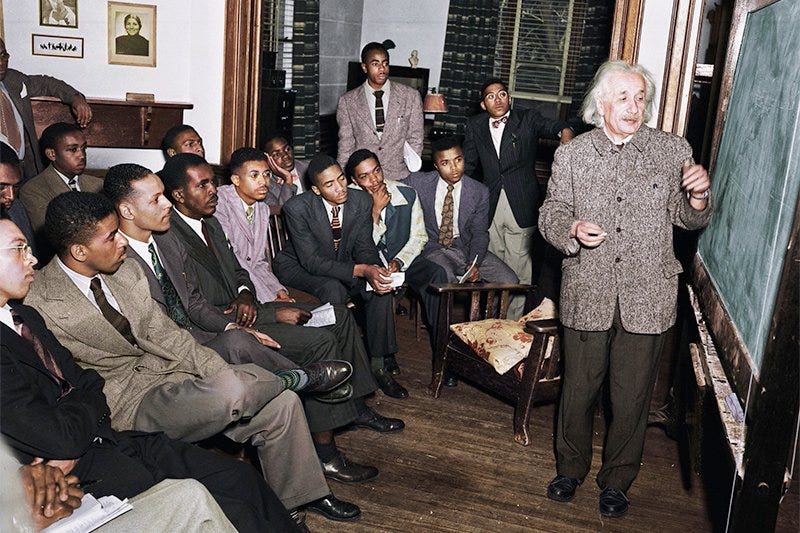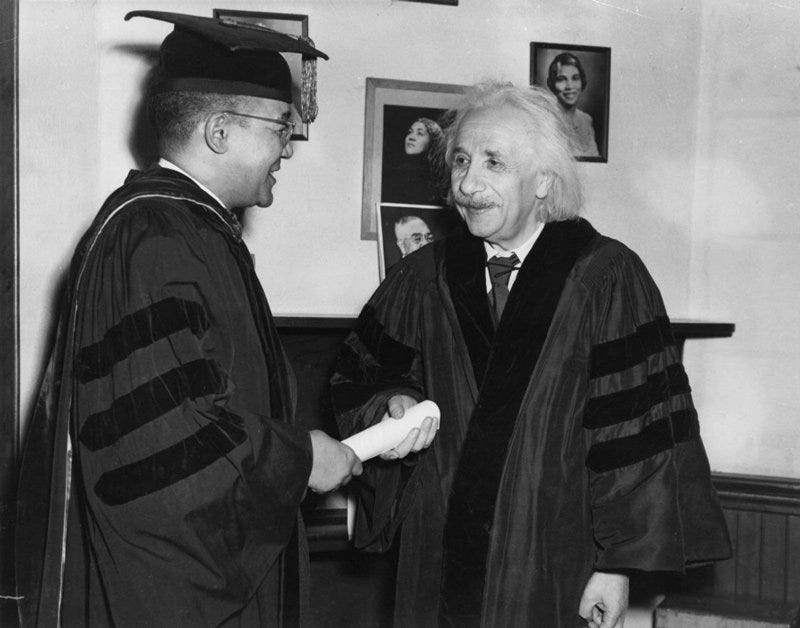Annotated Essay: Albert Einstein’s “Why Socialism?”
Why the world's smartest man was a socialist.
Hey folks — As I’m sure many of you are, I’ve been sickened by the news of the horrors coming out of Israel-Paliestine. Given the crisis is still ongoing, my inclination was to write another piece on the conflict, but to be honest I can’t bring myself to do it right now. The thoughts of death and destruction and occupation are too much for me to bear, as I’m sure they are for you. I don’t mean to ignore the ongoing suffering, and I’ll return to the subject shortly, but I really needed to let my mind go elsewhere for the moment.
I’ll leave you with this note, and hopefully, this annotated essay can offer you a bit of solace in this troubling time.
In Solidarity, Joe
One of the best things about being a leftist is the endless repository of writings by some of history’s greatest thinkers. From Karl Marx to Henry George, there’s no shortage of literature addressing the questions we still face today: Who should own land? Is wage labor a necessity? Can a planet with limited resources support a system of infinite growth?
While these historical writings are poetic and sage, they are often quite dated and difficult to read. That’s why I’m starting this series, “Annotated Essays.” Each installment will have snippets from a classic socialist essay interwoven with my commentary about what the author is saying. My goal is to make these works more accessible to a modern audience that doesn’t have time to wade through the difficult prose of centuries past.
If you’d like to see more of these articles, you can show me by “liking” it ( click the ❤️ button at the top).
Let’s begin.
Renowned for his world-changing physics work, Albert Einstein’s political beliefs have been whitewashed from history. As an open socialist and anti-racist, Einstein’s politics went against the Cold War-era mainstream. As a result, many Americans can recite “E=MC^2” but are unfortunately naive about Einstein’s study of economics and societal organization.

Though socialism came secondary to science, Einstein did grace us with the influential essay Why Socialism? in the 1949 inaugural issue of Monthly Review. Let’s read it, and see what history’s smartest man has to say about the way our society should structured.
Einstein begins with his thoughts on the present state of humanity.
“Nowhere have we (humanity) really overcome what Thorstein Veblen called ‘the predatory phase’ of human development. The observable economic facts belong to that phase and even such laws as we can derive from them are not applicable to other phases. Since the real purpose of socialism is precisely to overcome and advance beyond the predatory phase of human development, economic science in its present state can throw little light on the socialist society of the future.”
First, Einstein is saying that he agrees with Veblen’s claim that capitalism is “the predatory phase” of human development, as it requires humans to compete against each other and withhold resources. Second, he is saying that as the purpose of socialism is to move past predatory capitalism and build a new economic system, capitalist economics won’t be useful in a post-capitalist, socialist state. To properly plan a socialist economy, we’ll need to think differently.
“We should be on our guard not to overestimate science and scientific methods when it is a question of human problems; and we should not assume that experts are the only ones who have a right to express themselves on questions affecting the organization of society.”
This is interesting, as Einstein is saying his field of expertise, science, is not the best way to address “human problems,” such as how an economy should be structured. In my experience, academics tend to prioritize their field of study over all others. Einstein is doing the opposite, saying “the organization of society” (capitalism vs. socialism) is a question to be determined by all humans. Though he doesn’t state it explicitly, I can’t help but feel Einstein’s concern is that experts in a capitalist society have reached their high position through capitalism and are therefore incentivized to preserve it. Were the system to change, their stature, wealth, and ego would be threatened.
Next, Einstein describes an interaction with a friend who, like many others in the post-WWII time, was destitute and depressed. He explores this by detailing the relationship between individuals and society, and how a break in that relationship can cause humans to feel downtrodden.
“The abstract concept ‘society’ means to the individual human being the sum total of his direct and indirect relations to his contemporaries and to all the people of earlier generations. The individual is able to think, feel, strive, and work by himself; but he depends so much upon society—in his physical, intellectual, and emotional existence—that it is impossible to think of him, or to understand him, outside the framework of society. It is “society” which provides man with food, clothing, a home, the tools of work, language, the forms of thought, and most of the content of thought; his life is made possible through the labor and the accomplishments of the many millions past and present who are all hidden behind the small word “society.” It is evident, therefore, that the dependence of the individual upon society is a fact of nature which cannot be abolished—just as in the case of ants and bees.”
This is a common sentiment in socialist thought, one I share myself. One of capitalism’s great failings is that it gives all credit for success to the individual, mostly successful business tycoons. Einstein disputes this, pointing out that a man’s thoughts, personality, emotions, and the things he needs to survive (food, clothing, shelter) are only available to him thanks to society.
Einstein continues with the relationship between men and society. He believes most humans incorrectly see the tether between an individual and society as a negative force, while it should be viewed as a positive one.
“The individual has become more conscious than ever of his dependence upon society. But he does not experience this dependence as a positive asset, as an organic tie, as a protective force, but rather as a threat to his natural rights, or even to his economic existence… The economic anarchy of capitalist society as it exists today is, in my opinion, the real source of the evil. We see before us a huge community of producers the members of which are unceasingly striving to deprive each other of the fruits of their collective labor—not by force, but on the whole in faithful compliance with legally established rules.”




